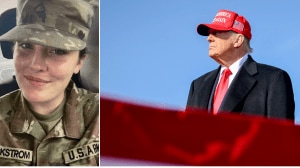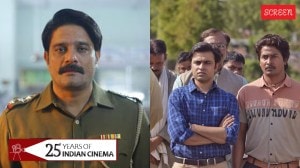Bush presses Gen on Taliban, fixes 3-way talks with Karzai
After 9/11, Armitage was rude, told us we will bomb you to Stone Age: Gen

Public praise and private pressure. The tough love that has marked US President George W. Bush’s engagement with Pakistan’s General Pervez Musharraf since 9/11 appears unchanged after five years.
Even as he “admired” Musharraf’s “courage” and “moderation” at a White House joint press appearance today, Bush refused to disown his controversial comments on getting hold of Osama bin Laden with or without the General’s permission.
Musharraf responded by saying the US and Pakistan were in a “joint hunt” of bin Laden and that there is no need to go into the “semantics” of territorial sovereignty.
With the talks in White House riveted on an increasingly shaky war on terror on the Pak-Afghan border, Bush said the conversation with Musharraf on bin Laden and the Taliban is unfinished.
On Tuesday, Bush meets Afghan President Hamid Karzai who is blaming Pakistan for the resurgence of the Taliban. Bush plans to have dinner on Wednesday with Karzai and Musharraf.
“I look forward to our trilateral discussion,” Bush told Musharraf in front of the press. “It’s going to be a good one, and it’s going to be an interesting one. And it’s an important discussion.”
Bush also declared he was unaware of the American threat in the wake of 9/11 to bomb Pakistan “into the Stone Age”. While he was “taken aback” by the harshness of the alleged remarks, Bush simply said, “I don’t of any (such) conversation.”
In an interview to be aired on Sunday on CBS television’s 60 Minutes programme, Musharraf said that after the attacks, Richard Armitage, then deputy secretary of state, had told Pakistan’s intelligence director that the US would bomb his country if it didn’t help fight terrorists. He said that Armitage had told him, “Be prepared to go back to the Stone Age.” Armitage has disputed the language attributed to him but did not deny the message was a strong one.
For his part, Musharraf declined to comment and cited a contract agreement with a publisher on his upcoming book.
The White House press conference demonstrated what binds Bush and Musharraf. The US President needs Musharraf’s cooperation in stabilising Afghanistan and capturing such al Qaeda leaders as bin Laden.
Musharraf, who plans to stay on in power for another term after the present one expires next year, needs American political support, economic largesse and arms supplies.
The bargaining between the U.S. and Pakistan Army leadership has taken place within this broader framework of political interdependence. New Delhi closely tracks meetings between Bush and Musharraf for any signs of weakening American resolve on issues that matter to India.
On two such questions — civilian nuclear deal and Jammu and Kashmir — India has reason to be satisfied tonight that Bush has held the line. Bush simply ducked a question from a Pakistani correspondent on the “discriminatory” treatment meted out to Islamabad by denying it nuclear energy cooperation that the Administration has offered India.
In response to another question on Kashmir, Bush was careful to limit himself to welcoming the recent meeting between Musharraf and Prime Minister Manmohan Singh in Havana and insisting that the U.S. has a limited role in “facilitating” an agreement on J&K between New Delhi and Islamabad. The key he said was with Musharraf and Singh.
India, however, will remain curious about the nature of the understanding between Bush and Musharraf on managing Islamabad’s eastern frontier with Afghanistan and on the internal politics of Pakistan.
As it so often happens in press conferences, what leaders don’t say is more important than what they do. To be sure, Bush said he “believes” Musharraf when the General tells him the deal in Waziristan was not meant to help Taliban. It might not be wrong to guess Bush would have told Musharraf behind closed doors that “seeing is believing.”
Assuming that nations operate on the basis of self-interest, it would be reasonable to bet that Bush, desperate to make a success of Afghanistan and facing a tough Congressional elections in two months, would have demanded immediate and credible action from Musharraf on bin Laden and the Taliban.




- 01
- 02
- 03
- 04
- 05



























